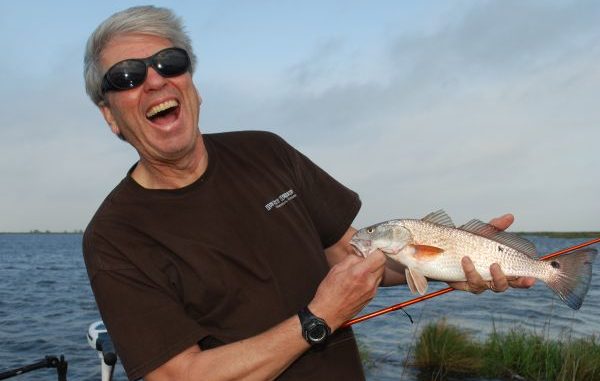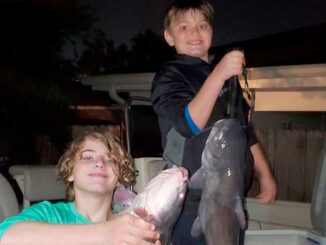
Bob Marshall almost became an optometrist. At a career day at his high school, a young optometrist spoke to the seniors.
“He really got me interested,” said Marshall. “It sounded cool.
“I was accepted at a school in Oregon. Then I found out that that optometry was nothing but physics — and I didn’t like physics.
“So I went back to my first love, journalism. My whole family loved to read. We subscribed to two newspapers.”
He enrolled at Loyola University in New Orleans.
“By the end of my first semester I was in love with journalism,” he said. “They had a great staff.”
Marshall wrote his first outdoors piece on lake-runner fishing for the Loyola Maroon, the college newspaper.
After graduating in May, he went to work for an advertising agency in Metairie.
“I didn’t want to go to work for the Picayune,” he explained. “They were one of the worst newspapers in the country. The States Item was better, but they had no openings.”
By August, the company he worked for was going under. The States Item still had no openings, and feelers for employment in Atlanta and St. Louis came up empty.
He needed a job, and he needed one quickly. He had a wife and son. So he hired on with one of the small weekly Guide newspapers.
“I was a general-assignment and sports writer,” he said. “It paid well — $130 a week — more than the Picayune offered.
“I told my wife we would try it one year and if I can’t get a job at a daily newspaper, I would go to law school. I did an eight-page outdoors special, both the writing and the photography.”
That work opened the next door for the budding outdoor writer.
“Unknown to me, States Item sports writer Nat Belloni read it and liked it,” Marshall said. “I got a call that there was an opening and got hired because Nat Belloni was impressed with my writing. They sent me to Saints football training camp in Hattiesburg, Miss. The paper’s editor, Charlie Ferguson, liked my work enough that I got the Saints beat at 21 years old. I also got a call from Loyola Law School, but told them I was having too much fun. It was 1972.
“My first day on the job, I was being introduced around. There was a guy sitting in a chair. He had salt-and-pepper hair and looked like he hadn’t shaved in a couple of weeks. He was snoring.
“They woke him for an introduction. His first words were, ‘Pip, pip, podnah.’ Art Burke, the sports editor said to me, ‘You’re the fisherman. You get to do By HEK.’
Harry Elliot Klein, who always went by ‘HEK,’ who was really paid to be a tack-up artist for the newspaper’s photos and illustrations, also wrote the paper’s outdoors column, By HEK. He would scribble it out on legal paper in what looked like a doctor’s handwriting. It was full of misspellings and run-ons, and had no punctuation. The first day I got 12 or 14 pages. I took it home and dressed it up.
“The next day, I was warned that HEK was mad and looking for me. ‘Watcha trying to do to me?’ he asked. ‘You made me sound like Hemmingway.’ I had to learn HEK-ese.”
He finally pushed to expand the outdoor coverage.
“After a couple of years I said, ‘It’s crazy that a city this size doesn’t have an outdoors page,’” Marshall said. “HEK only had a column, not a page. Management agreed and I started doing fishing reports and tide tables.”
After eight or nine years of covering both football and doing the outdoors page, Marshall got tired of doing it all and, emboldened by job offers from several other papers, pushed to do a recreational sports section in what was now, after the merger of the two papers, the Times Picayune.
Created in 1981, the Wednesday section titled Venture, covered other participatory sports besides hunting and fishing, including running, backpacking, bird watching, canoeing and hiking.
He still had his traditional hunting and fishing section on Sundays.
He did both sections as part of what he called a “dream job” until 2005’s Hurricane Katrina. Then he spent most of the next year investigating what happened with levees and flood walls.
“They wanted me on the news side,” Marshall said. “I wanted to stay in the outdoors. (Management) said that there was no reason: Subscribers were down, and the paper was smaller.
“I lost Venture first, then lost one of two pages on Sundays. At the time, there were big issues that could affect outdoors sports — wetland protection regulations, the cutting of (the Conservation Reserve Program), oil and gas leasing on public lands, suggestions to repeal the Wilderness Act, suggestions to gut funding for the U.S. Fish and Wildlife Service. It go tougher and tougher to cover in a smaller space.
“Newspapers all over the country were in decline, even though ours was healthy. They made a decision to go to three issues a week. They offered me a position, but it didn’t make economic sense. And I knew I had other opportunities.
It was a dream job; it was incredible. I was happy to find out that they were going to keep a full-time outdoors writer, and they made the right selection with (former Louisiana Sportsman editor) Todd Masson.”
